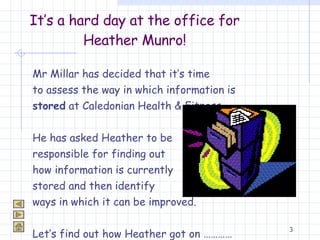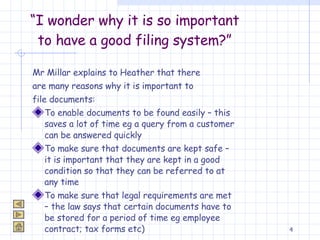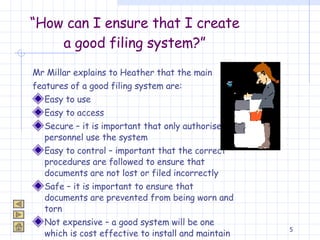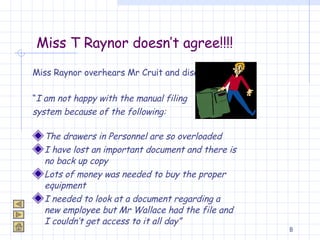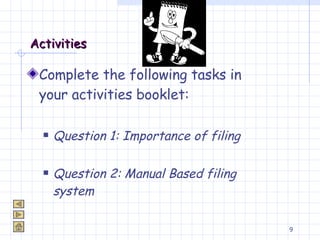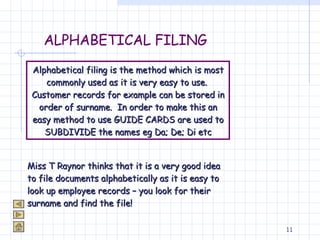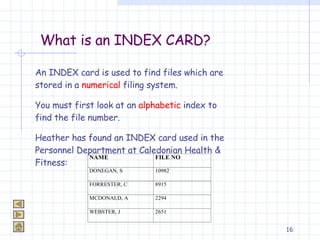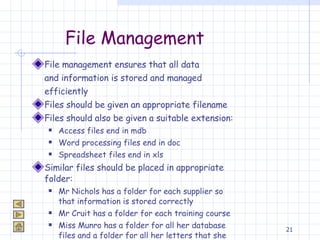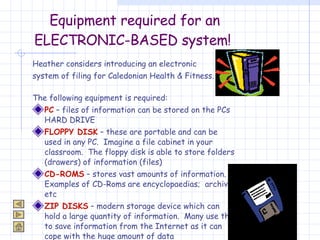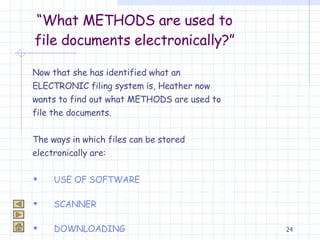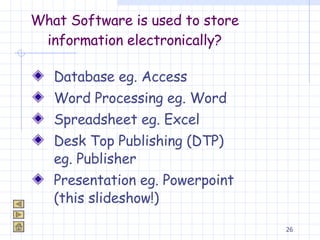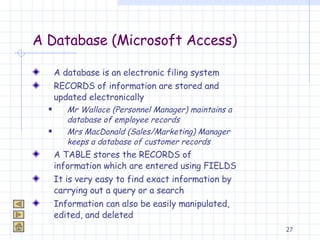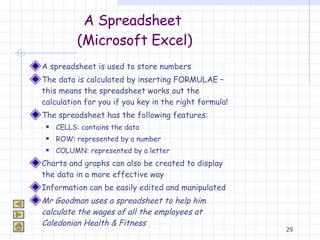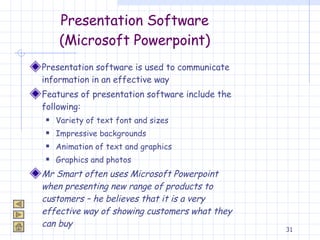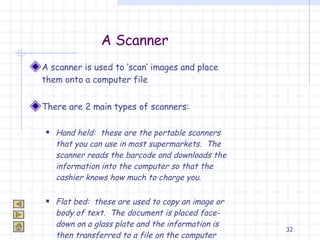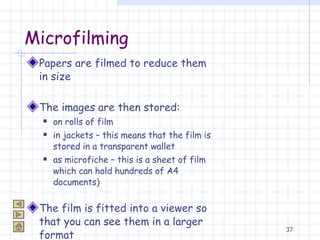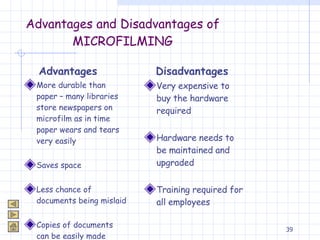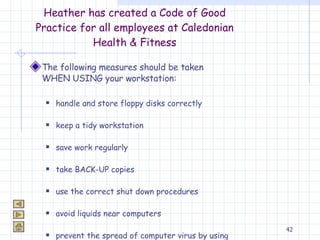Unit 3 - Storage & Retrieval of Information
- 1. Unit 3 Storage and Retrieval of Information
- 2. Learning Outcomes Heather’s Task Importance of a good filing system Features of a good filing system Manual Based filing system Methods of filing Electronic Based filing system File Management Methods of filing electronically Back-up Procedures Microfilming Security of Information
- 3. It’s a hard day at the office for Heather Munro! Mr Millar has decided that it’s time to assess the way in which information is stored at Caledonian Health & Fitness. He has asked Heather to be responsible for finding out how information is currently stored and then identify ways in which it can be improved. Let’s find out how Heather got on …………
- 4. “ I wonder why it is so important to have a good filing system?” Mr Millar explains to Heather that there are many reasons why it is important to file documents: To enable documents to be found easily – this saves a lot of time eg a query from a customer can be answered quickly To make sure that documents are kept safe – it is important that they are kept in a good condition so that they can be referred to at any time To make sure that legal requirements are met – the law says that certain documents have to be stored for a period of time eg employee contract; tax forms etc)
- 5. “ How can I ensure that I create a good filing system?” Mr Millar explains to Heather that the main features of a good filing system are: Easy to use Easy to access Secure – it is important that only authorised personnel use the system Easy to control – important that the correct procedures are followed to ensure that documents are not lost or filed incorrectly Safe – it is important to ensure that documents are prevented from being worn and torn Not expensive – a good system will be one which is cost effective to install and maintain
- 6. “ What type of filing is currently used at Caledonian Health & Fitness?” Heather decides to find out how employees currently file their documents. She discovers that MANUAL-BASED systems are used. The examples of these methods of filing are: SORTERS – these are used to file away folders FILING TRAY – Mr Burns has 3 types of filing trays: IN TRAY – for documents which need to be read; OUT TRAY – for documents which need to be passed on to someone else; PENDING TRAY – for work that still has to be done FILING CABINETS – to keep files secure and organised
- 7. Heather decides to find out what the employees think! Heather asks Mr Ray Cruit (the Recruitment Officer) what he thinks of the MANUAL system that he uses to file all his documents. “ I am really pleased with the manual filing system because of the following: It is very easy and quick to use There is very little training required which saves money Able to label drawers easily which means it is very easy to find what you are looking for The filing cabinets offer protection which means the files are secure ”
- 8. Miss T Raynor doesn’t agree!!!! Miss Raynor overhears Mr Cruit and disagrees! “ I am not happy with the manual filing system because of the following: The drawers in Personnel are so overloaded I have lost an important document and there is no back up copy Lots of money was needed to buy the proper equipment I needed to look at a document regarding a new employee but Mr Wallace had the file and I couldn’t get access to it all day”
- 9. Activities Complete the following tasks in your activities booklet: Question 1: Importance of filing Question 2: Manual Based filing system
- 10. “ What METHODS are used to file documents?” Now that she has identified what a MANUAL filing system is, Heather now wants to find out what METHODS are used to file the documents. The 3 main methods of filing are: ALPHABETICAL NUMERICAL CHRONOLOGICAL
- 11. ALPHABETICAL FILING Alphabetical filing is the method which is most commonly used as it is very easy to use. Customer records for example can be stored in order of surname. In order to make this an easy method to use GUIDE CARDS are used to SUBDIVIDE the names eg Da; De; Di etc Miss T Raynor thinks that it is a very good idea to file documents alphabetically as it is easy to look up employee records – you look for their surname and find the file!
- 12. Advantages and Disadvantages of ALPHABETICAL FILING Logical and straightforward to use Little training required No index required to guide you through the files as it is a DIRECT method Everyone must follow the procedure correctly Absent Card required when file is taken Not flexible – difficult to add in any new files once the system is up and running Takes up a lot of space – this is not a suitable method for a large organisation Advantages Disadvantages
- 13. What is an ABSENT CARD? An ABSENT card is used when a file is removed from its place in the filing system. The card clearly states WHO has the file; WHEN the file was taken; and, WHEN it was returned. The Absent card shown opposite is used in the Sales/Marketing Department at Caledonian Health & Fitness: MR SMART 580 05/10/05 30/08/05 MRS AMBLEON 135 28/08/05 02/07/05 MR SMART 452 01/07/05 DATE RETURNED BY WHOM FILE NUMBER DATE REMOVED
- 14. NUMERICAL FILING Numerical filing is when NUMBERS are used to file documents instead of letters. This method means that customer documents would be filed using their account number or employee records could be filed using their employee ID number Mrs McKenna thinks that this method of filing is ideal in the Finance Department as it is easy to see how many customer accounts there are – when a new customer joins Caledonian Health & Fitness they get the next number!
- 15. Advantages and Disadvantages of NUMERICAL FILING Quick to use Ideal for large organisations as when a new customer joins it is easy to expand the system The file number can be used as a reference number when dealing with a customer query An INDEX card is required – you need to tell employees what the number refers to so that they know it’s the right document If new customers join then someone has to take the responsibility of updating the index card Advantages Disadvantages
- 16. What is an INDEX CARD? An INDEX card is used to find files which are stored in a numerical filing system. You must first look at an alphabetic index to find the file number. Heather has found an INDEX card used in the Personnel Department at Caledonian Health & Fitness:
- 17. CHRONOLOGICAL FILING Chronological filing means that all documents are stored in date order – the most recent documents are placed at the front of the system. Mrs MacDonald thinks that this is an excellent system to store the customer magazines that have been produced as it is very easy to find a particular edition – last month’s or last year’s.
- 18. Advantages and Disadvantages of CHRONOLOGICAL FILING This is an excellent method to use if a key feature of the information stored is the DATE Can be easily used with alphabetical method of filing An INDEX card is required – you need to tell employees what the number refers to so that they know it’s the right document This method is not commonly used as it is unrealistic to store large amounts of information this way eg customer or employee documents Advantages Disadvantages
- 19. Activities Complete the following tasks in your activities booklet: Question 3: Can you guess the clue? Question 4: Problem solving – which is the best method to use? Question 5: Define the key terms
- 20. Time To Introduce an ELECTRONIC-BASED system! Before finding out what an electronic filing system is and how it operates it is first of all important to understand the importance of FILE MANAGEMENT
- 21. File Management File management ensures that all data and information is stored and managed efficiently Files should be given an appropriate filename Files should also be given a suitable extension: Access files end in mdb Word processing files end in doc Spreadsheet files end in xls Similar files should be placed in appropriate folder: Mr Nichols has a folder for each supplier so that information is stored correctly Mr Cruit has a folder for each training course Miss Munro has a folder for all her database files and a folder for all her letters that she types
- 22. File Management Activity Make sure that you have SG Admin folder in your server account Create the following folders: Database Spreadsheet Word Processing Now make sure that all your files are properly organised! Take care – you may need to create new folders to ensure that your files are stored correctly Are there any files which you no longer need? Time to DELETE them!!
- 23. Equipment required for an ELECTRONIC-BASED system! Heather considers introducing an electronic system of filing for Caledonian Health & Fitness. The following equipment is required: PC – files of information can be stored on the PCs HARD DRIVE FLOPPY DISK – these are portable and can be used in any PC. Imagine a file cabinet in your classroom. The floppy disk is able to store folders (drawers) of information (files) CD-ROMS – stores vast amounts of information. Examples of CD-Roms are encyclopaedias; archives etc ZIP DISKS – modern storage device which can hold a large quantity of information. Many use this to save information from the Internet as it can cope with the huge amount of data
- 24. “ What METHODS are used to file documents electronically?” Now that she has identified what an ELECTRONIC filing system is, Heather now wants to find out what METHODS are used to file the documents. The ways in which files can be stored electronically are: USE OF SOFTWARE SCANNER DOWNLOADING
- 25. “ Why is it important to back-up files of information?” It is imperative that back-up copies are made of all files to prevent data being lost. Data can be lost or corrupted in a number of ways: Faulty computer system and loss of power Virus – corrupted data Hardware and software stolen or mistreated
- 26. What Software is used to store information electronically? Database eg. Access Word Processing eg. Word Spreadsheet eg. Excel Desk Top Publishing (DTP) eg. Publisher Presentation eg. Powerpoint (this slideshow!)
- 27. A Database (Microsoft Access) A database is an electronic filing system RECORDS of information are stored and updated electronically Mr Wallace (Personnel Manager) maintains a database of employee records Mrs MacDonald (Sales/Marketing) Manager keeps a database of customer records A TABLE stores the RECORDS of information which are entered using FIELDS It is very easy to find exact information by carrying out a query or a search Information can also be easily manipulated, edited, and deleted
- 28. A Word Processor (Microsoft Word) A word processor stores information in a variety of formats: Letter Memorandum Notice Text can be presented using a variety of fonts and font sizes Graphics and pictures can also be used to enhance the document
- 29. A Spreadsheet (Microsoft Excel) A spreadsheet is used to store numbers The data is calculated by inserting FORMULAE – this means the spreadsheet works out the calculation for you if you key in the right formula! The spreadsheet has the following features: CELLS: contains the data ROW: represented by a number COLUMN: represented by a letter Charts and graphs can also be created to display the data in a more effective way Information can be easily edited and manipulated Mr Goodman uses a spreadsheet to help him calculate the wages of all the employees at Caledonian Health & Fitness
- 30. Desk Top Publishing - DTP (Microsoft Publisher) Desk Top Publishing is used to create a document which has a very professional appearance DTP is used to enhance text DTP enables the following documents to be created: Business card Newsletter Magazine Brochure Calendar Banner DTP is a very useful tool in making documents of a very high standard of quality
- 31. Presentation Software (Microsoft Powerpoint) Presentation software is used to communicate information in an effective way Features of presentation software include the following: Variety of text font and sizes Impressive backgrounds Animation of text and graphics Graphics and photos Mr Smart often uses Microsoft Powerpoint when presenting new range of products to customers – he believes that it is a very effective way of showing customers what they can buy
- 32. A Scanner A scanner is used to ‘scan’ images and place them onto a computer file There are 2 main types of scanners: Hand held: these are the portable scanners that you can use in most supermarkets. The scanner reads the barcode and downloads the information into the computer so that the cashier knows how much to charge you. Flat bed: these are used to copy an image or body of text. The document is placed face-down on a glass plate and the information is then transferred to a file on the computer
- 33. Downloading Downloading is a feature commonly used in today’s business environment Information can be extracted from any internet site and DOWNLOADED onto a computer file It is a sophisticated way of copying information from one stored area to another
- 34. Advantages and Disadvantages of ELECTRONIC FILING Saves space Easy to find information Documents can be scanned easily Back-up copies of documents can be made easily More than one person can view the same information at the same time Use of passwords means that information is secure Very expensive to buy the hardware and software required Hardware and software needs to be maintained and upgraded Training required for all employees There may be a fault in power supply or a virus may occur resulting in loss of data Hackers may steal confidential information Advantages Disadvantages
- 35. Manual or Electronic? Heather reports back to Mr Millar on her findings. When deciding upon using a manual filing system or an electronic filing system the following factors must be taken into consideration: Costs – how expensive is the system? Space required – need to consider office layout Training required – time and money Benefit to management – is it a step forward and an improvement on current system?
- 36. Activities Complete the following tasks in your activities booklet: Question 6: File Management Question 7: Create a notice Question 8: Equipment Question 9: Back-up Procedure Question 10: Uses of software Question 11: Manual or Electronic?
- 37. Microfilming Papers are filmed to reduce them in size The images are then stored: on rolls of film in jackets – this means that the film is stored in a transparent wallet as microfiche – this is a sheet of film which can hold hundreds of A4 documents) The film is fitted into a viewer so that you can see them in a larger format
- 38. Equipment needed for Microfilming Camera for filming the documents Viewer (Reader) used for reading the microfilm (to make it easier to read, the film is enlarged onto a screen) Print used to make the copies from the negative Processor used to develop the film
- 39. Advantages and Disadvantages of MICROFILMING More durable than paper – many libraries store newspapers on microfilm as in time paper wears and tears very easily Saves space Less chance of documents being mislaid Copies of documents can be easily made Very expensive to buy the hardware required Hardware needs to be maintained and upgraded Training required for all employees Advantages Disadvantages
- 40. Security of Information There are many methods used to ensure that information is kept secure: Issue passwords and log-ons to each employee – exactly as you are at school so that only you can access your own information Issue security ID cards (swipe cards) – this means that only authorised personnel are able to access certain area of the building, files etc More sophisticated methods are: Fingerprints Voiceprints Retina or signature scanners
- 41. Use of Passwords It is important that the following measures are adopted: Passwords must be changed regularly to prevent hackers accessing your account A mixture of upper and lower case letters should be used to make the password more complex and difficult to copy Keep the password confidential at all times The following must not occur: Never give your password to someone else Never write your password down on a piece of paper Never use your own name or that of relatives as they can be easily guessed and copied
- 42. Heather has created a Code of Good Practice for all employees at Caledonian Health & Fitness The following measures should be taken WHEN USING your workstation: handle and store floppy disks correctly keep a tidy workstation save work regularly take BACK-UP copies use the correct shut down procedures avoid liquids near computers prevent the spread of computer virus by using anti-virus software
- 43. Heather has created a Code of Good Practice for all employees at Caledonian Health & Fitness The following measures should be taken WHEN AWAY FROM your workstation: activate password protected screensaver so that no-one can access any information log-off or shut down the computer before you leave remove any working disk (this may be a floppy disk, CD-Rom, flash card or zip disk) store disk in lockable disk-box (where do your disks go at the end of each lesson?) position screen so that it cannot be read by visitors do not leave printouts lying around – they may be of a confidential nature and anyone could pick them up!
- 44. The Data Protection Act Heather has been made aware of the Data Protection Act and has made the following notice to show to all employees: The Data Protection Act says that all personal data must be: Collected lawfully Used for a specific purpose Only held for as long as it is needed Accessible only to authorised personnel Made available to allow the individual to view information held on them Accurate and up-to-date at all times
- 45. Activities Complete the following tasks in your activities booklet: Question 12: Security of information Question 13: Security of software Question 14: Data Protection Act


